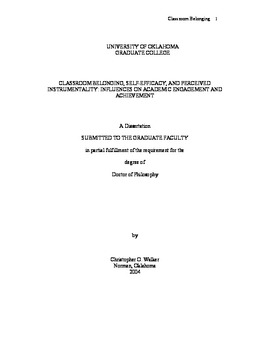| dc.contributor.advisor | Greene, Barbara A., | en_US |
| dc.contributor.author | Walker, Christopher O. | en_US |
| dc.date.accessioned | 2013-08-16T12:19:31Z | |
| dc.date.available | 2013-08-16T12:19:31Z | |
| dc.date.issued | 2004 | en_US |
| dc.identifier.uri | https://hdl.handle.net/11244/785 | |
| dc.description.abstract | Self-efficacy, perceived instrumentality, belonging, achievement goals, cognitive engagement strategies, and enjoyment were measured using five questionnaires distributed and completed in the participant's English class. Achievement was defined as the percentage grade that each student earned at the conclusion of the spring semester. Correlations, regressions, and path models were used to analyze the data. | en_US |
| dc.description.abstract | The goal of the present study is to examine student perceptions of belonging, self-efficacy, and perceived instrumentality in terms of their unique and collective contribution to understanding student reported mastery goals, meaningful cognitive engagement strategies and achievement. Two hundred and forty-nine secondary students ranging in age from 14 to 19 years old from three high schools participated in the present study. | en_US |
| dc.description.abstract | Results indicated that there was a correlational relationship between belonging, self-efficacy, and perceived instrumentality. Belonging also explained additional variance beyond self-efficacy and perceived instrumentality when accounting for mastery goals, but not meaningful cognitive strategy use or achievement. Theoretical implications of the findings are discussed, as are limitations and implications for future research. | en_US |
| dc.format.extent | viii, 105 leaves; | en_US |
| dc.subject | Group identity. | en_US |
| dc.subject | Academic achievement. | en_US |
| dc.subject | Education, Educational Psychology. | en_US |
| dc.subject | Self-efficacy. | en_US |
| dc.subject | High school students Psychology. | en_US |
| dc.title | Classroom belonging, self-efficacy, and perceived instrumentality: Influences on academic engagement and achievement. | en_US |
| dc.type | Thesis | en_US |
| dc.thesis.degree | Ph.D. | en_US |
| dc.thesis.degreeDiscipline | Department of Educational Psychology | en_US |
| dc.note | Adviser: Barbara A. Greene. | en_US |
| dc.note | Source: Dissertation Abstracts International, Volume: 65-08, Section: A, page: 2900. | en_US |
| ou.identifier | (UMI)AAI3143545 | en_US |
| ou.group | Jeannine Rainbolt College of Education::Department of Educational Psychology | |
